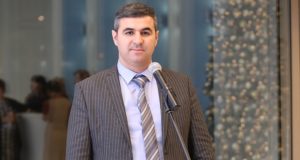By Seymur Mammadov

The hostilities in Nagorno-Karabakh that began on September 27 have been completely suspended. On November 9, President of the Republic of Azerbaijan Ilham Aliyev, Prime Minister of the Republic of Armenia Nikol Pashinyan and President of the Russian Federation Vladimir Putin signed a statement announcing a complete ceasefire and all hostilities in the zone of the Nagorno-Karabakh conflict from 00:00 Moscow time on November 10, 2020. Russian peacekeepers have already been sent from Ulyanovsk to ensure security in Nagorno-Karabakh. According to the agreement signed between the three parties, the Aghdam region will be returned to the Azerbaijani side by November 20, 2020; by November 15, 2020, the Republic of Armenia undertakes to return the Kelbajar region to Azerbaijan, and by December 1, 2020 – the Lachin region; internally displaced persons and refugees will be returned to the territory of Nagorno-Karabakh and adjacent areas; the exchange of prisoners of war and bodies of the dead will be carried out; construction of new transport communications linking the Nakhchivan Autonomous Republic with the western regions of Azerbaijan will be ensured; Russia’s peacekeeping contingent will be deployed in parallel with the withdrawal of the Armenian armed forces.
Signing of a Russian-Turkish agreement on interaction within the framework of the peacekeeping and monitoring mission in Nagorno-Karabakh is expected very soon. What does this mean? Turkish peacekeepers will work in Karabakh together with Russian ones. In fact, this is a new format of interaction in the region, not only within the framework of the conflict settlement, but also for future development. Unblocking all transport communications will benefit all countries in the region – not only Azerbaijan, Armenia, but Turkey and Russia. For example, the Nakhchivan region, which was distant from Azerbaijan by the territories of Armenia, will finally have a land connection with its mainland state. This is a very important event for Azerbaijan, as the azerbaijanis reached Nakhchivan exclusively by air.
It is the factor of a high degree of trust between Baku and Moscow, between Baku and Ankara, between Ankara and Moscow that played a decisive role in achieving a complete ceasefire in Nagorno-Karabakh. A new geopolitical reality has been created in the region, which will allow in the future to implement new large projects in the interests of all regional and non-regional players. Armenia, which for almost 30 years has been completely isolated from all projects implemented in the region – from transport, oil and gas pipeline projects, will now have the opportunity to leave the vicious circle and become one of the participants in new projects, especially transport projects that will be implemented in the future. Of course, everything will depend on the Armenian side. Time will tell whether Armenia wants to participate in regional projects.
Azerbaijan’s restoration of full control over the Iranian border (until October 22, a 132-kilometer section of the Iranian-Azerbaijani border was under the control of Armenia), will allow Iran to fully use the economic potential of its northwestern provinces in close integration with the liberated cities of Fizuli, Jebrail, Zangilana. The 27-year-old obstacle in the way of Iran and Azerbaijan has now been completely removed, which means that in the post-war period, Iranian-Azerbaijani relations will strengthen in both the political and economic spheres. First of all, the implementation of an agreement on cooperation between Azerbaijan and Iran in the field of continuing the construction of hydropower facilities and hydropower stations “Khudaferin” and “Giz Galasy” on the river of Araz, which was signed during the visit of President Ilham Aliyev to Iran on 23 February 2016, will begin.
Azerbaijan’s relations with Russia and Turkey will definitely strengthen in the post-war period, since these countries played an extremely important role in resolving the Karabakh conflict. Turkey has always openly supported Azerbaijan’s right to return its lands. İn turn, at the height of hostilities in Karabakh, Russian President Vladimir Putin said that Azerbaijan is fighting on its territory, not on the territory of Armenia. Iran also tried to make its own contribution to the peaceful settlement of the Karabakh conflict, for example, it offered both conflicting parties its own plan for the settlement of the conflict; Iranian Supreme Leader Ali Khamenei said that “Azerbaijani territories should be returned to Azerbaijan, which has the right to liberate them.”
As we can see, the settlement of the Nagorno-Karabakh conflict became possible due to two factors. The first factor is the unshakable political will of the leadership of Azerbaijan and the will of the Azerbaijani people. The second factor – apart from Turkey, other regional players – Iran and Russia – also supported Azerbaijan’s right to return its occupied lands. The demonstration by these three large countries of common solidarity in the Karabakh issue actually forced the military-political leadership of Armenia to sign an agreement on surrender.
And what is most interesting is that this agreement does not contain a single word about the status of Nagorno-Karabakh. Although earlier, the Azerbaijani side offered wide autonomy to the Nagorno-Karabakh region within Azerbaijan in exchange for the liberation of all occupied territories. Now Nagorno-Karabakh and 7 adjacent regions will not only de jure, but also de facto under the control of Azerbaijan. Azerbaijan managed to fully restore its territorial integrity.
